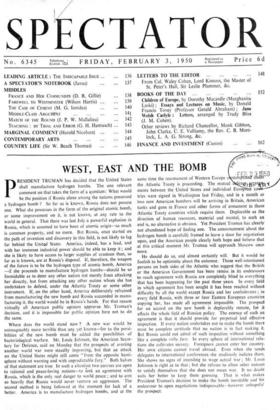WEST, EAST AND THE BOMB
\o',04s 4,44, pRESIDENT TRUMAN has decided that the United States shall manufacture hydrogen bombs. The one relevant comment on that takes the form of a question: What would be the position if Russia alone among the nations possessed a hydrogen bomb ? So far as is known, Russia does not possess one. What she possesses in the form of the original atomic bomb, or some improvement on it, is not known, at any rate to the world in general. That there was last July a powerful explosion in Russia, which is assumed to have been of atomic origin—so much is common property, and no more. But Russia, once started on the path of invention and discovery in this field, is not likely to lag far behind the United States America, indeed, has a lead, and with her immense industrial power should be able to keep it ; and she is likely to have access to larger supplies of uranium than, so far as is known, are at Russia's disposal. If, therefore, the weapon of the future is to be the hydrogen type of atomic bomb, America —if she proceeds to manufacture hydrogen bombs—should be so formidable as to deter any other nation not merely from attacking her directly, but from attacking any other nation whom she has undertaken to defend, under the Atlantic Treaty or some other instrument. If, on the other hand, America deliberately refrained from manufacturing the new bomb and Russia succeeded in manu- facturing it, the world would be in Russia's hands. For that reason virtually all American public opinion approves Mr. Truman's -decision, and it is impossible for public opinion here not to do the same.
Where does the world stand now ? A new war would be unimaginably more terrible than any yet known—for to the possi- bilities of the new bomb must be added the possibilities of bacteriological warfare. Mr. Louis Johnson, the American Secre- tary for Defence, said on Monday that the prospects of averting another world war were steadily improving, but that an attack on the United States might still come "from the opposite hemi- sphere without warning and with unpredictable fury." Both halves of that statement are true. In such a situation two courses are open to rational and peace-loving nations—to ;eek an agreement with Russia, which is the only real danger to world peace ; and to arm so heavily that Russia would never venture an aggression. The second method is being followed at the moment for lack of a better. America is to manufacture hydrogen bombs, and at the
same time the rearmament of Western Europe c the Atlantic Treaty is proceeding. The mutual u ewe/ tic_arot ments between the United States and individual Europ tries were signed in Washington last Friday, and in .11 month or two now American bombers will be arriving in Britain, American
tanks and guns in France and other forms of armament in those
Atlantic Treaty countries which require them. Deplorable as the direction of human resources, material and mental, to such an
end is, no alternative is obvious. Yet President Truman has clearly not abandoned hope of finding one. The announcement about the hydrogen bomb is carefully framed to leave a door for negotiation open, and the American people clearly both hope and believe that at this critical moment Mr. Truman will approach Moscow once more.
He should do so, and almost certainly will. But it would be foolish to be optimistic about the outcome. Those well-intentioned persons on both sides of the Atlantic who suggest that the British or the American Government has been remiss in its endeavours to reach agreement with Russia are completely blind to everything that has been happening for the past three years. In every field
in which agreement has been sought it has been reached without difficulty by all the world except Russia and her confederates ;in
every field Russia, with three or four Eastern European countries copying her, has made all agreement impossible. The prospect for an accord on the new bomb is deplorably remote, for it affects the whole field of Russian policy. The essence of such an agreement is that it should provide for perpetual `and effective inspection. If every nation undertakes not to make the bomb there must be complete certitude that no nation is in fact making it.
But Russia could not admit of such inspection without something like a complete volte face. In every sphere of international rela-
tions she cultivates secrecy. Foreigners cannot enter her country.
Her own citizens cannot travel abroad. Even when she sends delegates to international conferences she studiously isolates them.
She shows no signs of intending to wage actual war ; Mr. Louis Johnson is right as to that ; but she refuses to allow other nations to satisfy themselves that she does not mean war. It no doubt suits her better to keep them- guessing. That is what makes President Truman's decision to make the bomb inevitable and his endeavour to open negotiations indispensable—however unhopeful the prospect. nt-I5a 1125°


































